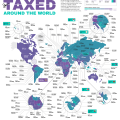
Income tax is an inevitable and challenging ordeal for many salaried employees. Not only is it difficult to sort out, but income taxes can significantly reduce your take-home pay. As such, knowing the basics of income tax and its effects on your salary can help you determine the best tax-saving options.
Check out the following tax-saving options that you can consider to reduce your owed taxes and maximize your take-home pay.
5 Tax-Saving Options for Salaried Employees
- Tax Deductions
When managing your finances, consider leveraging tax deductions to enjoy the most of your income. Salaried employees can use this tax benefit to deduct various expenses from their taxable income, reducing their liability amount. It has two types: standard and itemized deductions.
Standard deductions are fixed amounts taxpayers can deduct from their income. It varies based on their filing status, age, and the like. For 2023, the amount deductible from an individual’s taxable income in the United States, depending on their status, is as follows:
- Single: $13,850
- Married (but filing separately): $13,850
- Married (but filing jointly): $27,700
- Head of household: $20,800
- Surviving spouses: $27,700
On the other hand, itemized deductions involve only specific expenses taxpayers can deduct from their income. These costs include mortgage interests, state and local taxes, and medical expenses. Salaried employees often opt for itemized deductions if the total deductible amount for this type is higher than the standard one.
However, not all expenses are eligible for this deduction, and some may already have a cap. Additionally, certain deductions may not qualify on the taxpayer’s income level.
- Tax Credits
Unlike tax reduction, tax credits directly reduce the taxes a taxpayer owes. In other words, it doesn’t affect the taxable income but instead deducts an individual’s taxes, providing a dollar-for-dollar reduction in the liability amount. Below are some of the tax credits you can avail of.
Earned Income Tax Credit (EITC)
Low- to moderate-income working individuals and couples can avail of the EITC. Taxpayers can receive a refund even if they owe no taxes under this tax credit. It is also called a tax incentive since the US government may reimburse taxpayers for eligible expenses if the EITC amount exceeds the owed tax.
A taxpayer qualifies for this tax credit if their earned and adjusted gross income (AGI) is below the set threshold. Moreover, the factors that determine their EITC limit include how many dependents they have and their household status. For 2023, the qualifications are as follows:
| Dependents | Max. AGI for Single, Head of Household, Surviving Spouse, or Married (but filing separately) | Max. AGI for Married (but filing jointly) | EITC limit |
| 0 | $ 17,640 | $24,210 | $600 |
| 1 | $46,560 | $53,120 | $3,995 |
| 2 | $52,918 | $59,478 | $6,604 |
| 3 | $56,838 | $63,698 | $7,430 |
American Opportunity Tax Credit (AOTC)
The AOTC is a tax credit for those paying academic-related expenses for the first four (4) years of a student’s tertiary education, providing a credit of up to $2,500 per eligible student. These costs include tuition, fees, and course materials.
An individual is eligible for the AOTC if:
- They incur qualified higher education expenses;
- They pay educational fees for eligible students; and
- They, their spouse, or claimed dependent are the eligible student.
Other Tax Credits for Salaried Employees
People earning salaries can also take advantage of the following tax credits:
- Child Tax Credit
- Saver’s Tax Credit
- Premium Tax Credit
- 401(k) Plans
Many employers in the US offer a 401(k) plan for retirement. This tax-saving option allows employees to save for retirement while receiving tax benefits. Employees contribute a portion of their pre-tax income for investment purposes, whether mutual funds or another type.
One of the most significant benefits of this plan falls on its pre-tax basis. Simply put, the contributions of salaried employees are subtracted from their gross pay before taxes, reducing their taxable income. As a result, they pay less in taxes in the years they make 401(k) contributions.
Moreover, a 401(k) plan is tax-deferred and is only subject to taxes when you withdraw them during retirement.
- Flexible Spending Account (FSA)
A flexible spending account is a beneficial tax-saving option for salaried employees with high out-of-pocket healthcare costs. It allows employees to set aside pre-tax dollars for eligible medical, dental, and vision expenses while reducing their overall tax liability.
Typically, an FSA lets employees use the full annual amount available on the first day of their plan year, even if their contribution hasn’t reached that level. This way, they can pay for eligible expenses early on without waiting until they contribute the total amount. However, employees must use up all their FSA funds by the plan year’s end to avoid forfeiture.
While some plans offer a grace period or a carryover provision, it’s still best for salaried employees to plan carefully to avoid losing funds.
- Charitable Donations
Charitable donations can help reduce US taxes, especially for salaried employees who what to support a cause they care about. Donating to qualified charitable organizations allows employees to receive tax deductions while positively impacting their community.
Salaried employees should itemize their tax return deductions to claim this tax-saving option. They must subtract their charitable donations and other deductible expenses from their AGI. This way, they can reduce their taxable income and qualify for a lower tax rate.
However, not all charitable donations are eligible for a tax deduction. In other words, you must donate to a tax-exempt nonprofit that the Internal Revenue Service (IRS) recognizes. Additionally, there are limits on the charitable donations you can deduct in a given tax year, depending on your AGI.
Leverage Tax-Saving Options to Build Your Wealth
Tax savings is one of the crucial aspects of your financial plan. Aside from being difficult to manage, your taxes can significantly reduce the amount of money for your expenses and savings.
Remember that the money you save in taxes can significantly help you achieve your financial goals and enjoy your take-home pay to the fullest. With this, you can build wealth effectively without over-compromising your wants and needs.






